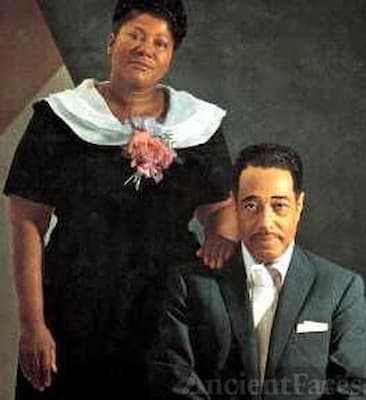Isaac Hockenhull Biography
Isaac Hockenhull is recognized as an American personality and the former spouse of the renowned Mahalia Jackson. Mahalia Jackson, his former wife, was a notable American gospel singer, acknowledged as one of the most impactful vocalists of the 20th century.
Isaac Hockenhull’s spouse, Jackson, made significant contributions to the advancement and dissemination of gospel blues in African-American churches across the United States during her four-decade-long career.
Despite the prevalent racial segregation in American society during her time, she achieved substantial and unexpected success in her recording career, selling approximately 22 million records and performing for integrated and non-religious audiences in concert venues worldwide.

Isaac Hockenhull Family and Death
Isaac Hockenhull came into this world on November 15, 1901, in Como, Mississippi. His parents, John Hockenhull and Mattie Danner, were 33 and 28 years old, respectively. In 1936, Hockenhull tied the knot with Mahalia Jackson in Chicago, Illinois. He breathed his last in July 1973 in Harvey, Illinois, at the age of 71.
Initially trained as a chemist, Isaac found himself working as a postman during the challenging era of the 1930s Depression. It was during this period in 1935 that he encountered his future wife, Mahalia. Mahalia was struck by Isaac’s persona, leading to their marriage a year later.
Nonetheless, records show that Mahalia Jackson married Isaac Hockenhull, a graduate of Fisk University and Tuskegee Institute, who was a decade her senior, in 1936. She maintained her vow to refrain from performing secular music throughout her professional journey, despite receiving lucrative offers.
However, their marriage encountered strains, and they eventually divorced in 1941 due to Isaac’s persistent insistence on her singing secular music and his gambling addiction concerning racehorses. Isaac’s mother, Martha, was an entrepreneur, selling her line of hair and skincare products. She passed down 200 formulas to her son and daughter-in-law. Despite their attempts, the couple failed to sell these products.
Financial challenges led Isaac to persuade a hesitant Mahalia to pursue her singing career, eventually transitioning from gospel to jazz and eventually to the stage. While Mahalia refused to abandon gospel music, she established a successful beauty salon and invested in real estate while continuing her weekend travels.
As Mahalia’s career and investments flourished, Isaac Hockenhull grappled with a gambling addiction, utilizing Mahalia’s assets as collateral for his debts and even purchasing a racehorse with her funds while she was on tour. Consequently, the two amicably divorced in 1943.
On his World War II draft registration card, Isaac Hockenhull indicated that he was 40 years old, of “Negro” ethnicity, employed by the American Car & Foundry Company, weighing 190 lbs, standing at 5 ft 7 in, with a light brown complexion, black hair, and brown eyes. He listed Mahalia Jackson Hockenhull as his next of kin.
Isaac Hockenhull’s Ex-Wife Mahalia Jackson
Mahalia Jackson, the former wife of Isaac Hockenhull, utilized the gospel blues style that was prevalent among soloists in black churches. To many white jazz enthusiasts, her style appeared unique and fresh, as she often served as their primary or sole introduction to gospel music. Consequently, she frequently faced requests to define her style and clarify her approach to singing.
Despite her lack of formal training and the inability to read or write musical notation, Jackson’s singing was heavily influenced by her instinctual approach. When questioned about her technique, she often responded with uncertainty, stating, “All I ever learned was just to sing the way I feel… off-beat, on the beat, between beats — however the Lord lets it come out.” Pressed for further details, she would simply admit, “Child, I don’t know how I do it myself.”
Known for her dynamic and powerful vocal range, which spanned from contralto to soprano, Jackson resisted categorizing her voice, describing it as “real strong and clear.” She incorporated elements of blues, employing bent or “worried” notes that added a distinctive tonality, as described by jazz aficionado Bucklin Moon as “an almost solid wall of blues tonality.”
Her musical expressions often included moans, hums, and extensive improvisation with rhythm and melody, characterized by extensive use of melisma, where several tones were sung per syllable. Author Anthony Heilbut referred to her vocal style as a “weird ethereal sound, part moan, part failed operatics.”
Gospel historian Horace Boyer attributed Jackson’s bold style and rhythmic patterns to her early exposure to the Pentecostal congregation during her childhood, emphasizing that she never conformed to the singing style commonly associated with Baptist tradition.
Mahalia Jackson passed away on January 27, 1972, at the OSF Little Company of Mary Medical Center in Evergreen Park, Illinois, United States. While on a European tour, she fell ill in Germany and returned to Chicago, where she was subsequently hospitalized.
Despite ongoing reports about her health issues and concert delays over the years, her sudden demise came as a shock to many of her admirers. Her funeral service took place at the Greater Salem Baptist Church in Chicago, where she remained a cherished member.
